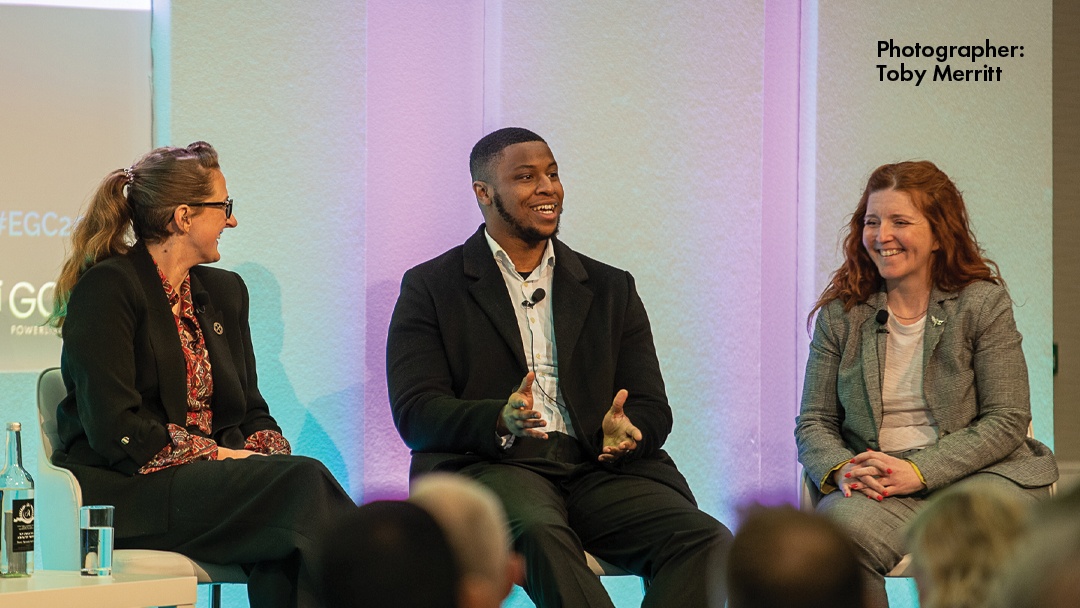Unperturbed by the somewhat damp weather conditions, the great and the good of the in-house community flocked to Enterprise GC and Syon House in April to enjoy a variety of stimulating plenary sessions, workshops, keynote speeches and roundtables, not to mention a glittering gala dinner in the great conservatory.
David Burgess, publishing director at The Legal 500, kicked off proceedings with a warm welcome to attendees and by introducing keynote speaker Bobby Duffy, professor of public policy and director of the Policy Institute at King’s College London. Duffy went on to give an insightful talk examining ‘Why we’re wrong about nearly everything’. He used data to expose our biases and misconceptions, encouraging the audience to re-examine how they traditionally think and act.
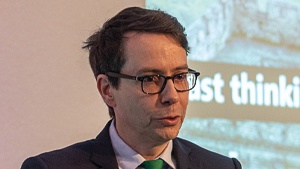
Returning to the stage, Burgess gave an engaging presentation on the topic of ‘The general counsel has to do more with less – really?’ The Legal 500 has surveyed in-house lawyers across the UK, to explore the real budgetary challenges and true pressure points for in-house teams, research from which was used to conduct an interactive deep dive into practice areas where growth is expected and where demand is slow. This was all done with the help of lively audience participation.
After a coffee break, delegates split into three breakout groups where they had the opportunity to network with their peers and discuss topics ranging from how to be better equipped for a riskier world, the art of legal project management and in-house counsel as generalist v. specialist.
This was followed by a thought-provoking fireside chat between Alistair Maiden, the chief executive of SYKE and Kriti Sharma, head of product, LegalTech, Thomson Reuter. The highly topical debate covered everything from what we really mean when we say ‘artificial intelligence’ to the next logical areas of innovation for AI to support legal professionals.
Next up was the first panel discussion, in association with Epiq. Nicholas Pouyiouros, senior legal operations consultant in the legal business advisory group of Epiq, Laura Farnworth, GC and company secretary at Atom Bank, and Mitzi Berberi, chief legal officer at Kiwi.com held an animated discussion on the subject of ‘What’s wrong with the billable hour?’ The panel, moderated by Georgina Stanley, UK editor of The Legal 500, debated the challenges surrounding the use of AFAs and determining value in the legal supply chain, as well as providing helpful insights about ways to look at budgeting and be smarter with your cost base.
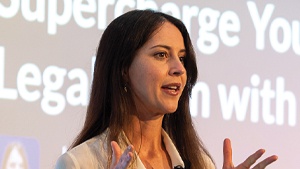
After lunch, attendees listened to a fireside chat between Jaeger Glucina, chief of staff at Luminance and Connagh McCormick, global general counsel at proSapient. The pair discussed how to automate processes, save costs, and drive business using AI, exploring McCormick’s experience of using AI to enhance his in-house team.
Attendees then split into breakout groups again, this time covering increasing efficiency, maintaining compliance, and developing opportunities with an AI-powered legal team, exploring practical applications of AI for in-house lawyers and the consumer and regulatory spotlight on sustainability and greenwashing.
The next session saw delegates participating in something slightly different, in the form of the UK’s first ever legal ‘gemba walk’, in association with Kantar and E.ON. The session was moderated by Mo Zain Ajaz, chief executive of LEx360, who was joined by Kirin Kalsi, director of UK legal, compliance and data protection at E.ON UK, Nilema Bhakta-Jones, group GC of Kantar and Ameen Ali, legal director, commercial at Kantar. The group talked through the threats and opportunities faced by their organisations, their team dynamics, and pioneering initiatives they had undertaken. They then shared a priority for their function which attendees were invited to support by sharing examples of what has worked and not worked for them. The team created an immersive environment that allowed attendees to feel as if they were walking the floor of the organisation in question.
From here attendees wandered over, under cover of umbrellas, to a drinks reception at Syon House, followed by a gala dinner at the great conservatory, allowing everyone to network and enjoy the grand classical interiors of Syon House.
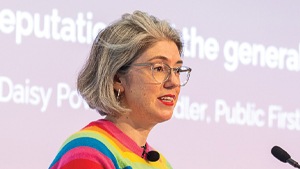
Day two started with a keynote speech from Daisy Powell-Chandler, director at Public First and host of the reputation podcast ‘Why Everybody Hates You’. Powell-Chandler encouraged attendees to embrace a more holistic view of the GC role by harnessing an understanding of their organisation’s reputation and purpose.
Next followed a panel discussion on ‘The future is AI, but is it all plain sailing?’ in association with KPMG Law. Nicola Brooks, managing director of legal operations transformation services at KPMG Law, Celia Moore, professor of organisational behaviour in the department of management and entrepreneurship, at Imperial College Business School, Paul Henninger, partner and headof UK connected technology and global lighthouse at KPMG and Matt Roach, head of i-4 cyber security leaders community at KPMG convened to discuss the ethical, data, cyber and other risks posed by the dramatic rise of AI and large language models.
The next session saw a panel discussion on reputation and the GC. Panellists Paula Alessandro, global GC of Standard Chartered Bank Ventures, Sharmin Takin, head of legal at UK Debt Management Office, HM Treasury and Anna Suchopar, general counsel and company secretary of ASOS, discussed where the responsibility for reputational issues within a company lies, and whether the traditional role of ethical gatekeeper is still the GC’s role.
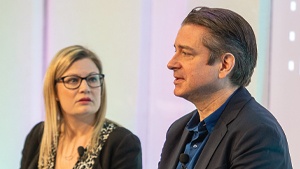
The second panel consisted of an excellent discussion on whether in-house counsel are doing enough to move the dial on DE&I and wellbeing. Kelly Thomson, partner and ESG strategic lead at RPC, Joy Van Cooten, associate general counsel of ACI Worldwide, Neil Harrison, general counsel of Aviva, Mandy Kaur, legal director of Pizza Express and Charlie Beasley, consultant at Egon Zehnder explored reporting mechanisms for DE&I, the power individuals have to enact change in the legal industry and how to be more proactive in this space.
Following lunch, was the conference’s final panel: ‘If you think millennials are a challenge, get a load of Gen Z’. Laura Field, managing director of SSQ, Terra Potter, general counsel for EMEA/AP & Industrial, Hexcel Corporation, Akil Hunte, trainee solicitor at CMS and chair of NRG Lawyers and Elizabeth Barrett, general counsel of Howden UK and Ireland asserted that for the first time in modern history, there are four separate generations co-mingling in the workplace: baby boomers, gen X, millennials, and gen Z. The panel gave an engaging and thoughtful take on whether the generations are actually that different, whether the way of motivating individuals and teams are changing and what we can learn from each other.
Rounding off the event, Nathalie Tidman, editor of Legal Business and The In-House Lawyer, led a discussion with Simon Cliff, the GC of City Football Group and Kate Tyers, GC and head of legal, on crisis management. The panel covered how legal departments have dealt with unexpected situations, often under pressure of public scrutiny, and what they have learnt from their experiences.


